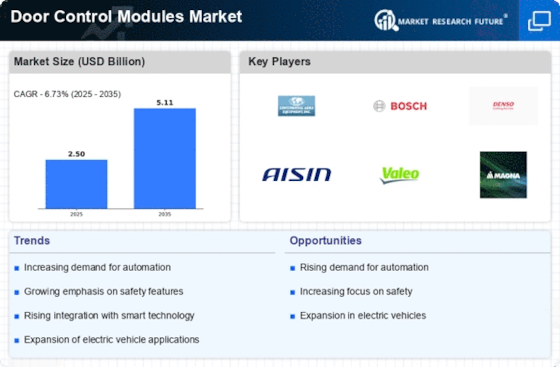Top Industry Leaders in the Door Control Modules Market
*Disclaimer: List of key companies in no particular order
Top listed companies in the Door Control Modules industry are:
Continental AG (Germany), STMicroelectronics (Switzerland), Robert Bosch GmbH (Germany), Texas Instruments Incorporated (US), WABCO (Belgium), Stoneridge, Inc. (US), Magna International (Canada), ROHM Semiconductor (Japan), HELLA GmbH & Co. KGaA (Germany), and Mouser Electronics, Inc. (US).
The door control module market is a dynamic, growing space in the broader automotive and access control industries. Comprised of sophisticated electronic units managing door functions, it's fueled by rising vehicle demand, increased automation, and evolving safety regulations. This competitive landscape is populated by established players and emerging entrants, all vying for market share through diverse strategies and innovations.
Key Player Strategies:
Tier 1 Suppliers: Established giants like Bosch, Continental, Denso, and ZF Friedrichshafen leverage their strong OEM relationships, technological expertise, and global reach. They focus on expanding product portfolios, integrating advanced features like anti-pinch technology and remote lock/unlock, and complying with regional safety norms.
Tier 2/3 Suppliers: These players, including Magneti Marelli, Delphi Technologies, and Joyson Safety Systems, compete on cost efficiency and niche specialization. They cater to specific vehicle segments or functionalities, offer customized solutions, and prioritize agile manufacturing for faster time-to-market.
Emerging Players: Startups and regional players are entering the fray with disruptive technologies like voice-activated door controls, facial recognition unlock, and connectivity with smart home systems. They leverage partnerships with established players or focus on specific regional markets to gain a foothold.
Factors for Market Share Analysis:
Product Portfolio Breadth: Offering a diverse range of modules for various vehicle types and functionalities caters to a wider customer base.
Technological Innovation: Integrating cutting-edge features like anti-intrusion systems, biometrics, and advanced safety protocols sets players apart.
Cost Competitiveness: Balancing quality with affordability, especially for budget-conscious segments, is crucial for market penetration.
Geographical Presence: Having a strong global footprint with manufacturing and distribution networks close to key markets provides a competitive edge.
OEM Partnerships: Secure long-term contracts with major automakers guarantees substantial market share and stable revenue streams.
New and Emerging Trends:
Cybersecurity: With increased connectivity, concerns about data breaches and hacking necessitate robust cybersecurity measures in door control modules.
Sustainability: Manufacturers are focusing on lightweight, energy-efficient modules, incorporating recycled materials, and reducing production footprint.
Personalization: Customization options for door locking/unlocking preferences, access control profiles, and integration with personalized vehicle settings are gaining traction.
Predictive Maintenance: Leveraging sensor data and AI-powered analytics for proactive maintenance of door control modules is being explored.
Seamless Integration: Blending door control modules with broader vehicle automation systems and smart home ecosystems creates a connected car experience.
Overall Competitive Scenario:
The door control module market is characterized by intense competition, with players constantly innovating, diversifying, and forming strategic alliances. Tier 1 suppliers maintain dominance, but agile Tier 2/3 players and disruptive startups pose challenges. Technological advancements, regional market variations, and evolving customer preferences create a dynamic landscape. Success hinges on adaptability, continuous innovation, and forging strategic partnerships for comprehensive solutions. The ability to cater to specific needs, ensure affordability, and embrace emerging trends will determine who thrives in this ever-evolving market.
Latest Company Updates:
STMicroelectronics (Switzerland): Launched a new family of low-power microcontrollers specifically designed for secure door control applications
Texas Instruments Incorporated (US): Released a white paper on secure authentication protocols for wireless door control systems
WABCO (Belgium): Acquired French door control manufacturer Serfis to expand its product portfolio and geographic reach
ROHM Semiconductor (Japan): Developed a new generation of power MOSFETs specifically designed for efficient door motor control










